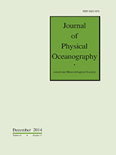
JOURNAL OF PHYSICAL OCEANOGRAPHY
Scope & Guideline
Navigating the Frontiers of Oceanographic Research
Introduction
Aims and Scopes
- Ocean Circulation Dynamics:
Research articles often explore the intricate dynamics of ocean currents, including large-scale circulation patterns, boundary currents, and their interactions with atmospheric systems. - Mesoscale and Submesoscale Processes:
The journal publishes studies on mesoscale eddies and submesoscale dynamics, emphasizing their role in mixing processes, energy transfer, and ecological implications. - Ocean-Atmosphere Interactions:
Papers frequently investigate the interactions between oceanic and atmospheric processes, including how these interactions influence climate variability and extreme weather events. - Mixing and Turbulence:
The journal covers research on turbulent mixing processes in the ocean, including the effects of stratification, internal waves, and topographic influences. - Remote Sensing and Observational Studies:
There is a significant emphasis on observational studies and the use of remote sensing technologies to enhance the understanding of oceanographic phenomena. - Numerical Modeling Approaches:
The journal encourages the development and application of numerical models to simulate oceanic processes, providing insights into future ocean behavior under varying scenarios.
Trending and Emerging
- Advanced Remote Sensing Applications:
Recent studies increasingly utilize advanced remote sensing techniques for ocean observation, facilitating the analysis of large-scale oceanic patterns and phenomena. - Interdisciplinary Approaches to Oceanography:
There is a growing trend towards interdisciplinary research that integrates physical oceanography with fields such as ecology, climate science, and atmospheric science, highlighting the interconnectedness of oceanic systems. - Impact of Climate Change on Ocean Dynamics:
Research focusing on the effects of climate change on ocean dynamics, including changes in circulation patterns, sea level rise, and ecosystem responses, is becoming more prevalent. - Machine Learning and Data-Driven Approaches:
The integration of machine learning techniques for analyzing oceanographic data and improving predictive modeling is an emerging trend, reflecting advancements in computational capabilities. - Focus on Submesoscale Processes:
There is an increasing emphasis on understanding submesoscale processes and their implications for mixing and nutrient transport, which are critical for marine ecosystems.
Declining or Waning
- Static Models of Ocean Dynamics:
There has been a noticeable decrease in publications focusing on static or overly simplified models of ocean dynamics, as researchers increasingly favor dynamic, adaptive models that account for the complexities of real-world ocean behavior. - Surface Phenomena without Depth Considerations:
Research that exclusively examines surface phenomena, neglecting vertical structure and dynamics, is becoming less common, with a growing recognition of the importance of depth-integrated studies. - Traditional Observational Techniques:
The reliance on traditional observational techniques without integration of advanced technologies, such as autonomous underwater vehicles or high-resolution satellite data, has decreased as the field moves towards more innovative methodologies.
Similar Journals

Ocean and Coastal Research
Exploring the depths of aquatic knowledge.Ocean and Coastal Research, published by the Institute Oceanográfico of the University of São Paulo, is an essential academic journal dedicated to advancing the fields of Aquatic Science, Oceanography, and Water Science and Technology. Established in 2020, the journal has quickly become a noteworthy platform contributing to the understanding and sustainable management of marine and coastal ecosystems, with an open access model that promotes the dissemination of critical research findings. Although currently categorized in the fourth quartile across its respective fields in 2023, the journal serves as an emerging repository of valuable insights for researchers, professionals, and students alike, aiming to make impactful discoveries that address contemporary challenges in ocean conservation and resource management. The journal's editorial team is committed to fostering interdisciplinary collaboration and upholding rigorous peer-review standards, thereby ensuring high-quality contributions that reflect the dynamic nature of marine science. With an E-ISSN of 2675-2824, all access to published articles is freely available, supporting global research efforts addressing crucial environmental issues.
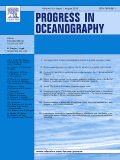
PROGRESS IN OCEANOGRAPHY
Connecting Scholars to the Ocean's SecretsPROGRESS IN OCEANOGRAPHY is a pivotal journal published by PERGAMON-ELSEVIER SCIENCE LTD, dedicated to advancing the field of oceanographic research and exploration. With an ISSN of 0079-6611 and an E-ISSN of 1873-4472, this esteemed publication has been disseminating significant findings from 1963 and continues to be a cornerstone in aquatic sciences and geology, holding a distinguished Q1 ranking in both categories as of 2023. The journal primarily focuses on innovative research that contributes to our understanding of ocean processes, marine ecosystems, and the impact of human activities on the oceans. Its exclusive access model facilitates the dissemination of high-quality content that resonates with researchers, professionals, and students alike, ensuring that vital insights are accessible to the global scientific community. With a firm commitment to upholding rigorous scientific standards, PROGRESS IN OCEANOGRAPHY remains an influential platform for the communication of groundbreaking research, providing scholars with invaluable resources to drive future oceanographic studies.

Journal of Ocean University of China
Pioneering Research to Harness Oceanic PotentialThe Journal of Ocean University of China, ISSN 1672-5182, is a premier academic journal dedicated to advancing the fields of Ocean Engineering and Oceanography. Published by the esteemed Ocean University of China, the journal serves as a vital platform for researchers, professionals, and students to disseminate groundbreaking findings and foster collaboration in marine science and engineering. With a commitment to quality, the journal currently holds a Q3 ranking in both Ocean Engineering and Oceanography as of 2023, indicating its significant contributions within the scientific community. The journal's scope encompasses a wide range of topics including marine technology, ecological studies, and coastal management, all aimed at enhancing the understanding and utilization of oceanic resources. Although currently not Open Access, it continues to attract submissions from renowned scholars, ensuring a diverse and innovative range of research. By providing access to cutting-edge research and practical insights, the Journal of Ocean University of China plays a critical role in shaping the future of ocean sciences and engineering.
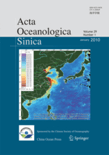
ACTA OCEANOLOGICA SINICA
Innovating Insights into Aquatic EcosystemsACTA OCEANOLOGICA SINICA, published by SPRINGER, stands as a significant voice in the fields of Aquatic Science and Oceanography, contributing vital research and insights since its inception in 1985. With an ISSN of 0253-505X and an E-ISSN of 1869-1099, this journal maintains a strong international focus, delivering high-quality peer-reviewed articles that address pressing marine and freshwater environmental issues. Although it operates under a subscription model, its Q3 ranking in both Aquatic Science and Oceanography demonstrates its solid standing within Scopus, placing it in the 48th and 44th percentiles respectively. The journal aims to foster knowledge exchange and collaboration among researchers, professionals, and students by providing a platform for innovative studies and comprehensive reviews. With a dedicated editorial board and a commitment to advancing scientific understanding, ACTA OCEANOLOGICA SINICA serves as an essential resource for anyone engaged in the study of oceanographic phenomena and aquatic ecosystems.

OCEAN DYNAMICS
Charting New Waters in Ocean ResearchOCEAN DYNAMICS is a premier peer-reviewed journal published by Springer Heidelberg, dedicated to advancing the field of oceanography. With an ISSN of 1616-7341 and an E-ISSN of 1616-7228, the journal has established itself as a key resource for researchers and professionals interested in the dynamic processes of the world's oceans. As of 2023, it holds an impressive Q2 category ranking in Oceanography, placing it among the top journals in its field (Rank #34/145, 76th percentile in Earth and Planetary Sciences). Although operating under a traditional publishing model without open access options, OCEAN DYNAMICS continues to provide valuable insights and a platform for innovative research, boasting coverage from 2001 to 2024. Researchers and students alike will benefit from this journal's commitment to showcasing cutting-edge studies that enhance our understanding of oceanographic phenomena.
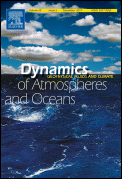
DYNAMICS OF ATMOSPHERES AND OCEANS
Advancing Knowledge in Climate DynamicsDYNAMICS OF ATMOSPHERES AND OCEANS, published by Elsevier, is a renowned journal that has established itself as a vital resource in the fields of atmospheric science, oceanography, and geology. With a rich publication history stretching from 1976 to 2024, this journal provides a platform for high-quality research that addresses the complex interactions between the atmosphere and oceans, which are critical to understanding climate change and environmental systems. It enjoys a respectable impact factor and a reputable position within its category quartiles, specifically noted as Q2 in critical domains such as Computers in Earth Sciences and Oceanography. Researchers and professionals benefit from its indexed coverage, featuring a Scopus ranking that places it among the leading journals in its categories. Although it is not an open-access journal, readers can access its cutting-edge articles through institutional subscriptions or individual purchases. The journal aims to foster cross-disciplinary dialogue and innovation by publishing original research, reviews, and insightful commentary, making it a cornerstone for scholars, students, and practitioners committed to advancing knowledge in the dynamic interplay of Earth's atmospheric and oceanic systems.
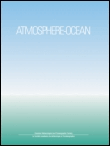
ATMOSPHERE-OCEAN
Charting New Waters in Environmental ResearchATMOSPHERE-OCEAN is a premier peer-reviewed journal published by Taylor & Francis Ltd, dedicated to advancing the fields of atmospheric science and oceanography. Since its inception in 1963, this journal has served as a crucial platform for researchers, professionals, and students, facilitating the dissemination of significant findings and innovative methodologies in understanding the complex interactions between the atmosphere and the ocean. With its journal ranking in the Q3 category for Atmospheric Science and Q2 for Oceanography as of 2023, along with its Scopus rankings, ATMOSPHERE-OCEAN maintains its relevance by addressing current topics such as climate change, hydrology, and ocean circulation patterns. For those seeking to contribute to or stay informed about the latest research in these critical fields, ATMOSPHERE-OCEAN is an invaluable resource that combines rigorous scholarship with practical implications for environmental management and policy.
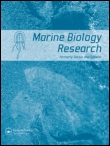
Marine Biology Research
Illuminating the wonders of marine life.Marine Biology Research is a premier journal published by Taylor & Francis, focusing on the dynamic field of marine biology and its intersecting realms of aquatic science, ecology, and oceanography. Since its inception in 2005, this journal has served as a crucial platform for researchers and professionals to disseminate their findings, with a vision extending to 2024 and beyond. The journal is recognized with a Q3 quartile ranking in both Aquatic Science and Ecology, Evolution, Behavior and Systematics, underscoring its growing influence in these fields as evidenced by its Scopus rankings. Located in the United Kingdom, Marine Biology Research aims to foster collaboration and innovation through open access options, facilitating knowledge exchange among the academic community. With a steady commitment to advancing marine sciences, this journal is an invaluable resource for those dedicated to understanding and preserving our ocean ecosystems.

OCEANOLOGY
Exploring the Depths of Oceanic KnowledgeOCEANOLOGY is a distinguished journal published by Pleiades Publishing Inc that has been a pivotal platform for advancing knowledge in the field of oceanography since its inception. With an ISSN of 0001-4370 and E-ISSN 1531-8508, this journal covers a range of topics related to marine sciences, geographical oceanography, and environmental studies, providing insights and research that significantly contribute to our understanding of oceanic systems. Recognized for its academic rigor, OCEANOLOGY holds a Q3 quartile ranking in the Oceanography category as of 2023, reflecting its impact within the scientific community as evidenced by its Scopus rank of 85 out of 145. Although currently not an open-access journal, OCEANOLOGY remains essential for researchers, professionals, and students by offering a comprehensive collection of peer-reviewed articles. This multidisciplinary approach equips its audience with valuable data and perspectives critical for ongoing research and development in ocean-related fields.

IZVESTIYA ATMOSPHERIC AND OCEANIC PHYSICS
Innovating research for a sustainable environmental future.Izvestiya Atmospheric and Oceanic Physics is a distinguished journal dedicated to advancing the fields of atmospheric science and oceanography, published by MAIK Nauka/Interperiodica/Springer. With a rich publication history spanning from 1972 to the present, this journal serves as a vital platform for both theoretical and experimental studies that enhance our understanding of complex atmospheric and oceanic systems. Despite its current categorization in the Q4 quartile according to the 2023 rankings, the journal continues to provide crucial insights, as evidenced by its established ranks in Scopus—placing it in the 15th and 26th percentiles of its respective categories. Researchers, professionals, and students alike are encouraged to contribute to and engage with the latest findings published in this journal, fostering a collaborative spirit within the scientific community dedicated to tackling pressing environmental challenges.